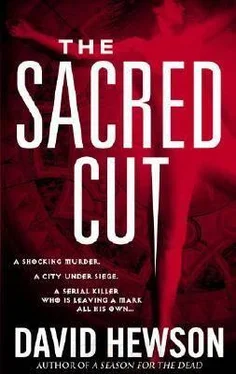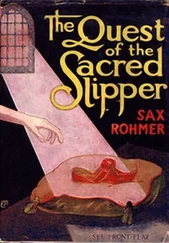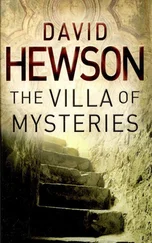“You’re prying, Monica,” she said. “You’re a stupid, nosy bitch who’s just got the night terrors from drinking too much. Who…”
She removed the khaki shirt, placed it in order alongside the rest of his belongings and felt her lungs freeze, go still, in unison with the breathless quiet of the night.
There was a gun there. A small, black, deadly looking gun.
She took it out, held it in her hand, where it fitted neatly, wondered how you made a weapon like this work if you needed one, then put it in the correct position on the table.
Next to the gun was a selection of things she couldn’t quite comprehend. What looked like a radio, with a little earphone. A bunch of silver tubes the size of cigarillos, with wires sticking out of one end, emerging from what looked like a wad of wax. A few notes: euros, dollars, all small denominations. And finally something that really bewildered her.
Monica Sawyer took the stuff out of the bottom of the bag and held it up to the sky. It was a carefully rolled-up hank of material of some kind. When she unravelled a little she saw it was cut into a repeating geometric pattern, a series of slashes that were clearly part of the design. She stretched it with her fingers and watched the way the precise slashes in the fabric stretched and pulled, keeping their shape, seeming to have some odd, internal strength that came as much from the material’s pattern and its precise arrangement of tears as from the textile itself.
“It’s rude to look,” said a voice from somewhere behind her.
Monica Sawyer tried to speak but all that came out was a kind of clack-clack-clack . She was scared. Of the shapes in the fabric. Of this place. Of this cold, cold night.
But more than anything, she was scared of this voice, which kept on speaking, using words her mind blocked her from hearing, kept on changing accent, changing tone, all coming from a shape that must have been perched somewhere on the roof all the time, looking at a frozen Rome perfect beneath a frozen sky.
NIC COSTA LOOKED OUT OF THE LIVING-ROOM WINDOW, out at the bright morning and a garden that was a perfect sheet of white, broken only by the bent old-men backs of olive trees sagging under the weight of snow. The farmhouse off the Appian Way couldn’t cope with the weather. It was still cold, in spite of two log fires roaring away at either end of the big, airy room. This was home, though, a good place to be. Since his father died and Costa had embarked on a lengthy, solitary recuperation from a near-fatal shooting, the house had rarely echoed to anything but his own footsteps. That was a shame. It was a place that needed people to make it live again.
He glanced at last summer’s logs crackling and sputtering in the ancient fireplaces, still damp from the snow, and remembered what his father had looked like during those final days, swathed in a blanket in his wheelchair, slipping away gradually, battling his disease every inch of the way. Then he heard the deep, round sound of Gianni Peroni’s guffaw roll out of the kitchen, followed, a little more hesitantly, by light young laughter.
Teresa Lupo walked out, shaking her head, and eyed the tray in his hands. “Are you going to take it up to her, Nic? Or shall I? That coffee’s going cold and there’s nothing Americans hate more than cold coffee.”
“I’ll do it. How is he?”
“Gianni?” Teresa’s eyes were shining, as if she’d been close to tears. She looked exhausted, but happy too. Costa had called her after the incident in the Campo. It was her decision to drive there straightaway, then on to the farmhouse. Costa wondered how they would have coped without her.
“He’s fine.” She sighed. “For an idiot. She’s a messed-up immigrant kid, Nic. I talked to the social people on the phone when you were asleep. They’ll have to take her into care. You can’t just”-she formed the words very deliberately-“transfer the way you feel about your own kids to someone else. However much you need to. Gianni just wants to be home with his own family. I know that. I don’t blame him.”
Costa wondered if it was really so simple. “The girl looks happy, Teresa. Maybe it works both ways. She’s seeing a little of her own father in him. Besides, he’s doing his job too. She refused to say a damn word until he began clowning around.”
“It’s not the girl I’m worried about,” she said with sudden severity. “He’s not the big, invulnerable hulk he looks, or haven’t you noticed?”
“I know.”
“Good. Now you take that coffee to your guest.”
He did as he was told and was unable to suppress slight nervousness when he knocked on the door of the guest room. It was now just before eight. Emily Deacon had slept solidly from the moment they took her back to the farmhouse and probably remembered little about the confused hour or so after she fainted in the Campo. She was going to wake up with plenty of questions. Costa took a deep breath. Then, when there was no response, he entered.
This had been his sister’s room before she went to Milan to work. It had an uninterrupted view back to the old Appian Way. The outline of the tomb of Cecilia Metella sat, a drum-like shape, on the horizon. He placed the tray on the bedside table, coughed loudly and waited as the American woman stirred slowly into consciousness, watching, with no little fascination, the way she was transformed from slumbering innocence back to the taut, alert FBI agent of the day before.
She looked around the room and frowned.
“Where the hell am I?” she demanded, then gulped at the glass of fresh orange juice.
“My house. With the girl. She’s downstairs with Peroni right now. You remember our pathologist?”
“I remember.”
“We got her to take a look at you after you fainted. We were worried you might have been concussed. You banged your head when you went down like that. You were… mumbling.”
“A pathologist? Thanks.”
“She used to be a doctor,” he said.
She felt her head. “You could have taken me home.”
“We didn’t know where home was. Your friend Leapman wasn’t exactly helpful when we spoke to him. He seemed more interested in the man.”
“As was I,” she grumbled.
“I’m sorry. We just didn’t know what else to do. We wanted Laila somewhere safe. It seemed to make sense.”
She swore quietly. “My, won’t I be in his good books now?” Then she looked at him and Costa could see she was remembering something afresh from the previous night. Something she didn’t care to explain just then. “I need to go into the office. Can you drive me?”
“Of course. The bathroom’s through that door. When you’re done, come downstairs. Peroni’s cooking breakfast. You might find it interesting. Also…”
He wanted to laugh. She was looking at herself, still in last night’s clothes, wrapped in the bedsheets, trying to clear her head.
“This is like being a student again,” she complained. “ ”Also“ what?”
“You might be able to forget about the bad books.”
MONICA SAWYER LAY STILL on the floor, arms hugging the coverlet he’d placed around her the previous night, the cord tight in her flesh, chestnut hair strewn around her face. She looked like a shattered doll dressed in a gaudy nightgown, mouth open, blank eyes staring at the ceiling. Purple thumb marks had turned livid on her neck. A line of dried blood stood on her lower lip.
It wasn’t a dream. In truth, he’d known that all along. Kaspar looked at her and felt something approaching regret. It hadn’t been planned. He’d lost control and that was bad. He fetched the bag and automatically, without a conscious thought, turned her over, sliced the scalpel down the back of the nightgown, then the scarlet slip, and stared at her back. Not bad for a woman in her forties. Smooth skin, barely blemished.
Читать дальше










